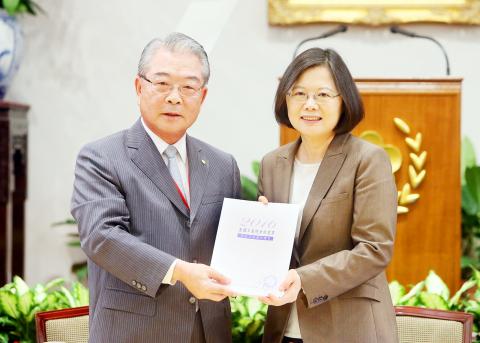President Tsai Ing-wen (蔡英文) yesterday said that the government would work to strike a balance between the interests of workers and industry, and find a win-win solution for both sides.
At a meeting with business leaders, Tsai said that while the administration would not leave enterprises to face the pressures of transformation alone, it would be certain to ensure workers’ rights.
She made the comment in response to the ongoing dispute concerning workers’ hours while meeting 55 of the Chinese National Federation of Industries board directors and supervisors, including chairman Hsu Sheng-hsiung (許勝雄) and vice chairman Leslie Koo (辜成允).

Photo: CNA
Tsai said that when she met representatives of small and medium-sized enterprises several weeks ago, she told them that industries in Taiwan have to speed up their transformation so that their profits can increase, more jobs can be created and salaries can be raised.
Tsai said that she understands that enterprises have to race against time to complete orders, while workers care more about salary levels and rest breaks.
“As the head of state, my job is not to curry favor with anybody. My responsibility is to decide on a direction of development for the nation and to ensure that everyone is on the development train,” Tsai said, adding that workers and businesses should move toward the goal together.
The nation’s most important goal is modification of the economic structure, she said, adding that the government would improve the investment environment and take measures to help companies, particularly small and medium-sized enterprises — which account for 98 percent of Taiwan’s total businesses — to transform themselves, while ensuring workers’ rights.
“The government has the responsibility to pull workers back from the brink of low pay and overwork,” she said, adding that the government would ensure all workers’ rights to receive paid holidays and overtime pay, and impose restrictions on work hours through robust enforcement of labor laws.
Tsai also said businesses should think about how to generate benefits and improve employees’ working conditions.
She also mentioned the dispute over a draft amendment to the Labor Standards Act (勞動基準法), saying that the proposal is aimed at ensuring workers’ right to a maximum of two paid days off per week, but has sparked heated debate among employees and employers.
The Executive Yuan and the Legislative Yuan should do their utmost to explain the issue to those concerned and allow them to express their views in order to reach a consensus on the matter, she said.
The government would also tackle a dispute regarding whether to cut the number of officially designated holidays per year from 19 to 12, as part of its plans to implement a two days off, 40-hour work week system, Tsai said.

MAKING WAVES: China’s maritime militia could become a nontraditional threat in war, clogging up shipping lanes to prevent US or Japanese intervention, a report said About 1,900 Chinese ships flying flags of convenience and fishing vessels that participated in China’s military exercises around Taiwan last month and in January last year have been listed for monitoring, Coast Guard Administration (CGA) Deputy Director-General Hsieh Ching-chin (謝慶欽) said yesterday. Following amendments to the Commercial Port Act (商港法) and the Law of Ships (船舶法) last month, the CGA can designate possible berthing areas or deny ports of call for vessels suspected of loitering around areas where undersea cables can be accessed, Oceans Affairs Council Minister Kuan Bi-ling (管碧玲) said. The list of suspected ships, originally 300, had risen to about

DAREDEVIL: Honnold said it had always been a dream of his to climb Taipei 101, while a Netflix producer said the skyscraper was ‘a real icon of this country’ US climber Alex Honnold yesterday took on Taiwan’s tallest building, becoming the first person to scale Taipei 101 without a rope, harness or safety net. Hundreds of spectators gathered at the base of the 101-story skyscraper to watch Honnold, 40, embark on his daredevil feat, which was also broadcast live on Netflix. Dressed in a red T-shirt and yellow custom-made climbing shoes, Honnold swiftly moved up the southeast face of the glass and steel building. At one point, he stepped onto a platform midway up to wave down at fans and onlookers who were taking photos. People watching from inside

Japan’s strategic alliance with the US would collapse if Tokyo were to turn away from a conflict in Taiwan, Japanese Prime Minister Sanae Takaichi said yesterday, but distanced herself from previous comments that suggested a possible military response in such an event. Takaichi expressed her latest views on a nationally broadcast TV program late on Monday, where an opposition party leader criticized her for igniting tensions with China with the earlier remarks. Ties between Japan and China have sunk to the worst level in years after Takaichi said in November that a hypothetical Chinese attack on Taiwan could bring about a Japanese

The WHO ignored early COVID-19 warnings from Taiwan, US Deputy Secretary of Health and Human Services Jim O’Neill said on Friday, as part of justification for Washington withdrawing from the global health body. US Secretary of State Marco Rubio on Thursday said that the US was pulling out of the UN agency, as it failed to fulfill its responsibilities during the COVID-19 pandemic. The WHO “ignored early COVID warnings from Taiwan in 2019 by pretending Taiwan did not exist, O’Neill wrote on X on Friday, Taiwan time. “It ignored rigorous science and promoted lockdowns.” The US will “continue international coordination on infectious